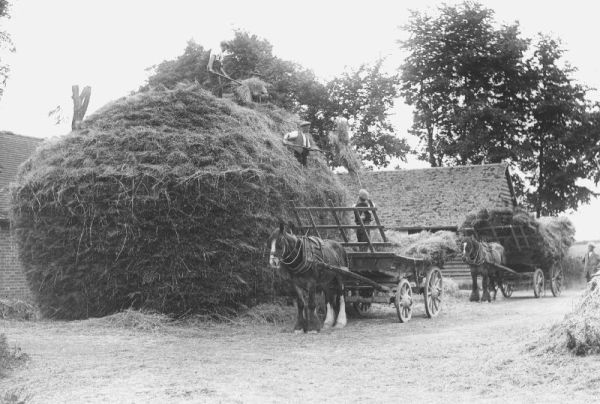
My Dad entered the job market in the 1930s, which wasn’t perhaps the best time, all things considered. Not only that but given his background he had a choice between going down the mines as an iron ore miner, or farm work, and being the rebel he was, he chose farm work. The wages were far lower, the hours longer, but when you were injured in an industrial accident it was at least above ground.
His first half year, when he was fourteen, earned him the princely sum of £13, plus of course his board. It’s reassuring to know that the great British public have always been careful to ensure those working in food production aren’t lured from the straight and narrow by too much easy money.
But before he started working full time, while he was still at school, he would work for the father of a lad he was at school with. Effectively he made sure he had learned the basics of his trade before he went out to start convincing people to pay him.
His mate’s father had a small farm, so they were never going to make a lot of money. On the other hand, one advantage of a small farm is that you cannot lose a lot of money either. Grow a thousand acres of wheat and lose £100 an acre, you’ve lost a £100,000. Grow ten acres of wheat and lose £150 an acre because you don’t have the economies of scale, you’ve still onely lost £1500.
But back then we’re talking much smaller amounts of money, a farm worker ‘living in’ did well to earn £2 a week.
But my Dad always had an admiration for his mate’s Father. He had a good eye for horses. Not fancy horses, or racehorses or anything like that, he was good with your ordinary work horse. So whilst he farmed in much the same way as everybody around him, he’d keep his eyes open for those working horses that were broken down with hard work. The delivery horses going round town, those owned by companies and used by employees who weren’t perhaps as committed to the horse as an owner-driver might be. He’d give the horse a good looking over first and then he’d buy them at sales or even straight from the company.
Then he’d just let them out into a field with his own working horses and leave them for a while. After a few months he’d harness them up again and start them working a little but nothing strenuous. Then when they were fit and strong again he’d sell them on. Apparently one of his best deals cost him perhaps ten shillings and year later he sold it for £11. But that was the way farmers got through the Great Depression.
There are a lot of tricks like that which have survived, farmers who’ve spotted a niche and have quietly filled it. The best niches are the unfashionable ones which are profitable enough to be worth doing but not so profitable that they tempt others to try and exploit them.
A while back I was chatting to one old farmer who had just sold some remarkably elderly ewes with lambs at foot in the spring sales. He’d also learned his trade from his father who’d learned his in the 1920s and 30s. They’d always bought a few pens of cull ewes when everybody was getting rid of them and the price was rock bottom. They’d worm them, stick them out on some coastal marsh that they had and leave them there to get heavier or whatever.
Unbeknown to him, the previous winter a tup had got in with his collection of old ladies and just when he was about to start selling them fat, they’d started lambing. So he lambed them and sold them with lambs at foot. Given he probably paid a tenner a head he was happy enough to take seventy or eighty pounds for a very elderly ewe with two lambs. His pride and joy was a small ewe with her single lamb who made £60. He’d never actually bought her. She’d come through the ring when he was buying the others. She’d looked so small and pathetic that the vendor couldn’t get a bid for her. So the frustrated vendor had surreptitiously dumped her in with a batch that had already been sold and had quietly disappeared.
♥♥♥♥
There again, what do I know, talk to the expert
As a reviewer commented, ”
This is a selection of anecdotes about life as a farmer in Cumbria. The writer grew up on his farm, and generations of his family before him farmed the land. You develop a real feeling for the land you are hefted to and this comes across in these stories. We hear of the cattle, the sheep, his succession of working dogs, the weather and the neighbours, in an amusing and chatty style as the snippets of Jim Webster’s countryman’s wisdom fall gently. I love this collection.”




